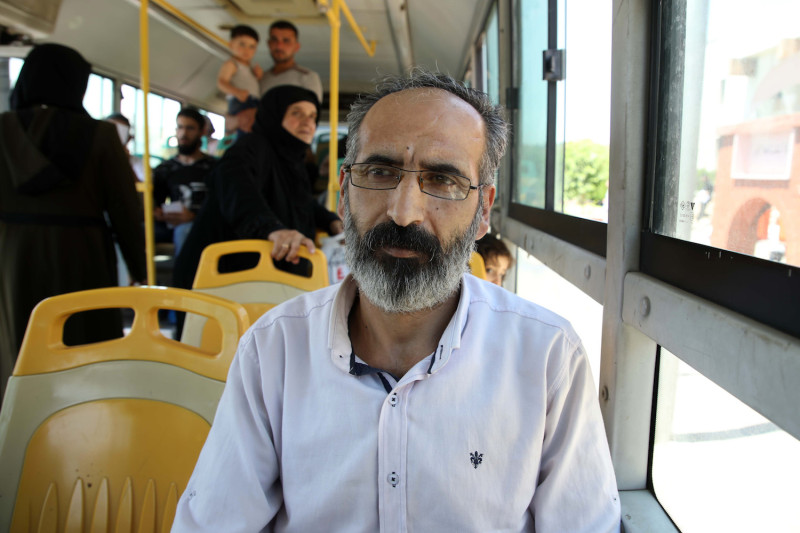Ankara once welcomed millions of Syrians as “guests.” Now, as anti-refugee sentiment rises, they are being sent back across the border, where they face danger and death.
“My future is destroyed,” said Hani Hilal, lamenting his deportation order on July 10 from Turkey to northern Syria. The 27-year-old was among the 1,000 Syrian men who recently received deportation orders from the Turkish government. Like many other Syrian refugees, he holds kimlik documents—legal papers guaranteeing his protection.
However, arrests and house raids have recently surged for Syrians living in Turkey, especially Istanbul, where many work. Turkish officials strictly refer to Syrian refugees as “guests,” potentially to sidestep international obligations to protect them. As a result, Syrian refugees are told they are overstaying their welcome.
Turkish officials strictly refer to Syrian refugees as “guests,” potentially to sidestep international obligations to protect them. As a result, Syrian refugees are told they are overstaying their welcome.
Once an outspoken activist against the former al Qaeda-affiliated group Hayat Tahrir al-Sham, Hilal now fears he will face retaliation from the militant group since his deportation to a Turkish-controlled area in northern Syria. He condemned the group for changing “the path of the revolution from aiming for a secular democratic state to an Islamic caliphate.”
Until recently, Hisham Moustafa Steif al-Mohammed worked in a garment factory in Istanbul and lived there with his wife and three children, where he was the only breadwinner. The Turkish police detained the 25-year-old one morning in late May while on his way to work because his kimlik was from another state in Turkey. A few weeks later, on June 15, he found himself on the Bab al-Hawa border crossing station heading to Idlib.
Turkish government officials claim that they are only deporting criminals and people who do not have kimlik papers. Hilal and Mohammed were neither. Hilal says he was threatened, harassed, and beaten after being rounded up alongside other Syrian men, all of them under 35 years old, on a bus in Izmir. He also said he was forced to sign deportation papers after being detained arbitrarily for a week. Hilal is now in an area controlled by Turkish-backed opposition forces in northern Syria, where he feels extremely unsafe. “I am not safe here, even in Turkish-controlled areas, and I can’t leave this house out of fear of al-Nusra and other groups,” Hilal said.
Human Rights Watch has condemned these recent developments, and several Syrians have reported that hundreds of men have been deported summarily, with their legal documents and belongings confiscated. Human Rights Watch documented that they have returned to neighborhoods in northern Aleppo and Idlib, both of which are far from safe.
Idlib continues to be pounded with Russian and Syrian army airstrikes. In July alone, Save the Children found that more children died in Idlib within that month than in all of 2018. On the ground, Hayat Tahrir al-Sham continues to kidnap aid workers, journalists, and activists across opposition areas.
Istanbul’s recent mayoral elections exposed growing intolerance toward Syrian refugees in Turkey. The newly elected mayor of Istanbul, Ekrem Imamoglu of the Republican People’s Party (CHP), followed his landmark victory by describing the refugee situation in Turkey as a “severe trauma.”
The newly elected mayor of Istanbul, Ekrem Imamoglu of the Republican People’s Party (CHP), followed his landmark victory by describing the refugee situation in Turkey as a “severe trauma.”
Imamoglu also mentioned that many Syrians are working unofficially, without noting the hurdles they face to obtain work permits and legal documents.Syrians in Turkey told Human Rights Watch in 2018 that they were arbitrarily “turned away from registration offices at least twice.” Only three interviewees were able to register after bribing officials with amounts between $300 and $500. Officials would often tell them there were “no more kimliks” to provide.
Anti-refugee sentiment in Turkey is not exclusive to the CHP. President Recep Tayyip Erdogan’s ruling Justice and Development Party (AKP), often seen as sympathetic toward refugees, has also promoted returns, despite the United Nations’ position that Syria is not yet safe. After establishing a northern enclave in Syria along the Turkish border, patrolled by Turkish-backed opposition groups, Erdogan said up to 1 million Syrians would return home. So far, around 6,000 have received deportation orders, according to the official website of one of the main crossing points on the border, Bab al-Hawa.
Syrians have played a significant role in Turkish domestic and foreign policy. A couple of years ago, Turkey had used Syrian refugees as a political bargaining chip in its deal with the European Union. The EU-Turkey deal in 2016 granted Turkey some $7 billion between 2016 and 2019, in addition to what seemed to be a revival of Turkey’s bid for EU membership by granting Turkish citizens visa-free access to Europe.
Source: FP



